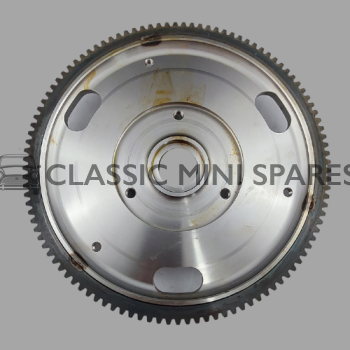Light Weight STEEL flywheel. For non-Verto clutch and non-pre-engaged starter.
see C-AEG420 for pre-engaged starter type.
"1 lb off the flywheel is like taking 100 lbs off the car." Not quite rational but close. This rule of thumb indicates the importance of flywheel performance. The stock cast iron 1275 flywheel is almost 22 lbs. Even the "S" flywheel weighs almost 17lbs. The stock flywheel is "cast" iron and thus not very safe to lighten.
This new "Road" Steel one piece flywheel is 11 lbs and provides tremendous improvement in acceration. (The full race version C-AEG619 is 8lbs.)
Special Tuning originally produced this flywheel and it was even fitted to Allegros by Leyland to stop clutch judder under warranty claims.
Effects of lightening rotating engine components:
(0.5 x n2 x r2 + R2) / R2
n = total gear ratio (gear ratio x diff ratio)
r = radius of gyration
R = Radius of wheel/tire
This formula gives what accelerative weight the engine sees of the car per lb.
Radius of gyration of a transverse engine's flywheel is approx. 3.75"
So to determine "weight loss" for a flywheel weight of say 18 lb to 10 lb,
the engine would see an overall weight loss of the car to accelerate in first gear of:
3.33 = 1st gear of 4 synchro 'S' box
3.44 = diff ratio
(0.5 x (3.33 x 3.34)2 x 3.752 + 9.52) / 9.52
= (0.5 x 131.2 x 14.06 + 90.25) / 90.25
= 1012.59 / 90.25 = 11.22 lbs
So for every 1 lb removed from the flywheel, the engine sees 11.22 lbs less
to accelerate off of the total car.
Therefore by lightening the flywheel by 8 lb,
the engine sees a total reduction of the cars accelerative weight of 89.68 lb.

